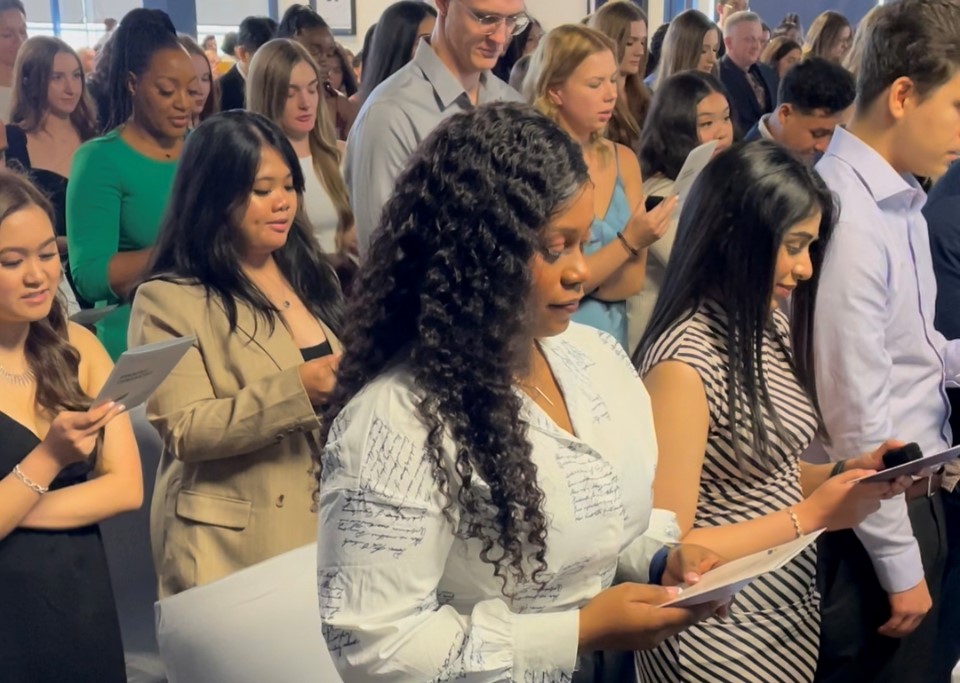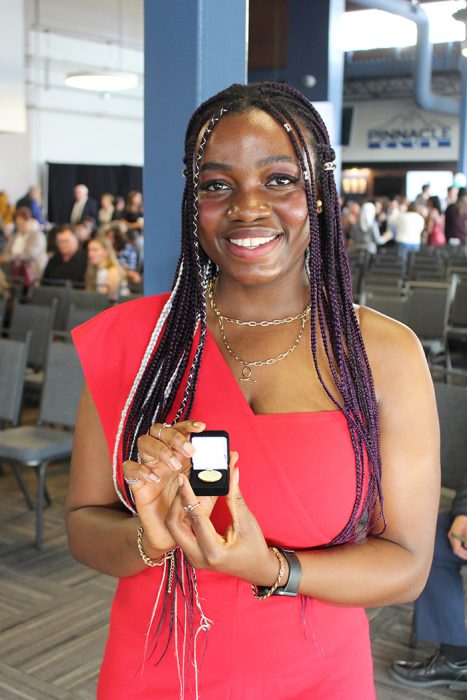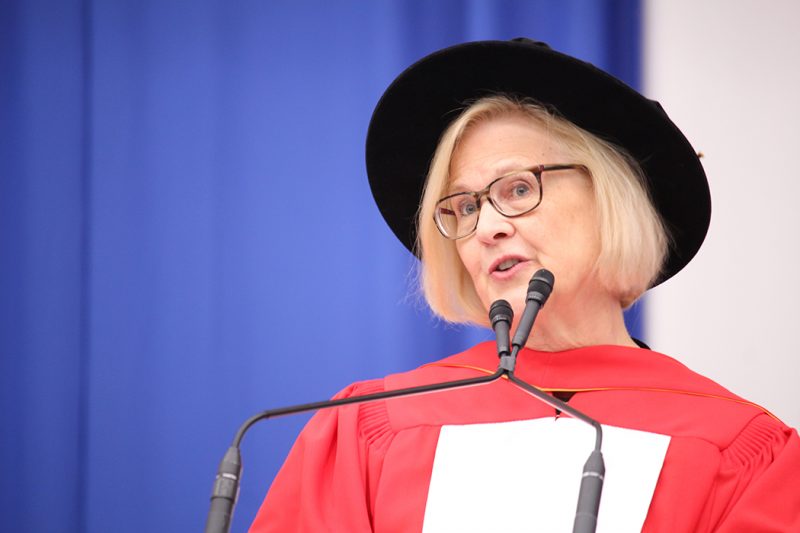
Nursing students read the UM nursing pledge at the pinning ceremony.
103 new nurses welcomed at pinning ceremony
The College of Nursing welcomed 103 new nurses to the profession at a pinning ceremony on Oct. 17 at the Pinnacle Club at IG Field. The group, which started the program in the fall of 2020, was the first to begin their studies with online learning due to the COVID pandemic.
“I think the pandemic made us stronger, more resilient. We knew what was ahead and we stuck with it,” said Vivian Umeohabike.
The 22-year-old international student from Nigeria was one of two valedictorians, along with Sydney Taucher.

Vivian Umeohabike
Umeohabike is currently working as a registered nurse in family medicine. While in the program, she served as senior stick (president) of the Nursing Students’ Association (NSA). She said she’s interested in returning to the university one day to become a nurse practitioner or explore leadership roles.
“There were a lot of challenges, but I really felt the program built my character and that is what I love about nursing,” she said.
The ceremony was emceed by Dr. Netha Dyck, dean of the College of Nursing, and included greetings from the MLA Uzoma Asagwara, Dr. Peter Nickerson, dean of the Rady Faculty of Health Sciences, UM President and Vice-Chancellor Michael Benarroch, Joyce Kristjansson, executive director of the Association of Registered Nurses of Manitoba, and Danielle Yaffe, five-time recipient of the NSA’s teaching excellence award.
“You are all compassionate human beings who chose a rewarding and enriching profession,” Yaffe told the new nurses. “It has been so enjoyable being part of your journey and seeing you become more confident and independent.”
At the ceremony, the new graduands received their nursing pin and recited the UM Bachelor of Nursing Pledge, which was inspired by the 1893 Florence Nightingale Pledge and has been adapted by the university.
Knowledge Keeper Brenda Longclaws offered an opening prayer, and an honour song was performed by Dr. Lisa Monkman.
Watch a social media video of highlights from the pinning ceremony.
Honorary degree

Linda Kristjanson
Following the pinning ceremony, the students officially graduated that afternoon at Convocation, along with 21 students from the college’s master of nursing program.
Dr. Linda Kristjanson, former president and vice-chancellor of Swinburne University of Technology in Melbourne, Australia, received an honorary degree at the ceremony. She is a two-time UM nursing alumna, earning a bachelor’s degree in 1977 and a master’s in 1983.
Kristjanson is considered a pioneer in the field of palliative care. She’s won several awards, including the Bethlehem Griffith Research Foundation Lifetime Achievement Award and Canadian Nurses Foundation Ross Award for Nursing Leadership in Research.
Before leaving Canada in 1997 to build a program in palliative care at Edith Cowan University in Australia, she served as the co-director of the Cancer Nursing Research Centre at UM.
Addressing convocation, Kristjanson reflected on the uncertainty she felt at the start of her career, and how she overcame that by learning to trust her curiosity.
“I chose to see the nervousness that accompanies the impostor syndrome as insight, a cue that I’m facing something new that I would be challenged by,” she said.
“When you notice feelings of uncertainty you might choose to take a few deep breaths as you dwell in areas where you are unsure, trusting that you will discover new understandings as you celebrate this important chapter of learning. Know that the next chapter is waiting to be written, you will use the foundation knowledge skills and values that you have taken you to this moment.”
Interdisciplinary Health Program
Other students that graduated at the ceremony include those in the Interdisciplinary Health Program at the Rady Faculty of Health Sciences. Five students graduated with a bachelor’s degree in health sciences and nine with a bachelor of health studies.
Jerni Stewart graduated with a bachelor of health sciences. Born and raised in Winnipeg, she is currently applying to medical schools.
“From the time I was 16 I always really wanted to be a doctor,” she said. “I originally started off in the faculty of science, but then I thought I was missing something in my degree. I wanted more of the social context of health, to learn the way Indigenous people see health and have more perspectives. The (IHP) health sciences program really captured all of that, which is what prompted me to apply.”
Olayeni Omisade, originally from Nigeria, graduated with a bachelor of health studies. Her long-term career goal is to work as a health policy analyst
“I applied for IHP because I thought I would like to help people by not only by treating them, but also by advocating for them,” she said. “This program helped me write and research better and also boosted my confidence. Before I was scared to talk, but now my confidence is much better.”






